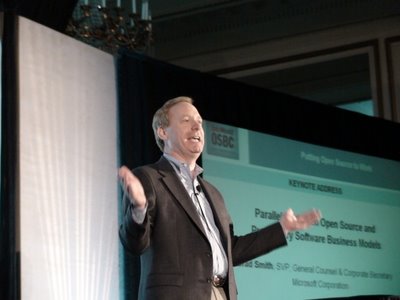Microsoft's Chief Counsel Brad Smith urges open source rivals to compromise on IP issues, co-exist peacefully


One attendee asked how Microsoft could collaborate with an industry that was described by Microsoft co-founder Bill Gates as communism and one that CEO Steve Ballmer called a cancer.
“Look, I’m not sure that’s a question that has a ready answer …. You don’t want people to live with those caricatures and stay in the caricatures,” Smith said. “I don’t think you’ve heard Bill, Steve or me talking in those terms as of late. “
“We’ve been trying to have a more constructive conversation,” he added. “It’s not like let’s all sing kumbaya. There are issues and we have differences but we’re trying to take steps.”
Smith noted that rivals Microsoft and Red Hat -- the operating system leaders in the proprietary and open source worlds -- are co Platinum sponsors of the OSBC 2008, contrasting it to the old days when Microsoft execs brought security guards for protection when they attended open source conferences. Microsoft wants peaceful coexistence, he said.
Referring to the famed open source treatise The Cathedral & The Bazaar, Smith likened Microsoft and other large proprietary companies to cathedrals that have “set up shop” around the bazaar.
“We believe in the importance of building bridges so different parts of the industry can work together,” Smith said, noting the company started to build bridges with Novell in November of 2006 and has executed pacts with many other open source companies including Xandros and Turbolinux.
“The Cathedral and the Bazaar. How does a a cathedral do deals with a Turkish bazaar and what we came to is there are a lot of cathedrals that set up shop around the bazaar and can do agreements with eachother.
“Is the bridge finished? No there’re a lot of room for more dialogue and but we do believe in this concept that the bridge can span diff development and business models is good for the industry.”
Microsoft will try harder to co-exist but it will remain a cathedral.
Another question, for example: Why was Microsoft now opening up some of its patented IP as part of its Open Specification Promise even as its legal counsel last summer identified hundreds of patents it was ready to defend in a court of law?
“We do want to make strides forward. We need to have a discussion about hard topics, patents and IP. It’s much harder than copyrights,” Microsoft chief counsel said. “We live on both sides of the patent fence. We have more patent lawsuits against us and we spent more money defending against patent lawsuits … we see firsthand the problems that exist in the patent system but we still believe in the benefits and value of well functioning patent system.”
Smith said the industry has evolved to a world where there are three business models that can survive. One is indirect monetization practices by the mainframe vendors in the past, who gave away the software to win big hardware deals. Microsoft’s Bill Gates then introduced direct monetization for software but the older model never went away, he said, noting that the software giant gives away software for free for its keyboard and hardware products.
And now, we’ve entered a new world where ad funded software is the new way of software monetization.
All can co-exist, he said. Microsoft has tried to move forward over the last two years but it will continue to monetize its IP, he said, noting that both sides –open source and proprietary companies—need to compromise and negotiate to find common ground.
And like cross licensing patent deals customary in the proprietary software world, Microsoft will hammer out agreements with open source companies -- without giving away its software.
“We do what any business would do and look at it on a project by projects basis. We’re much better connected with the open source community. We love open source running on Windows. I can’t give you an answer that is a blank check … we’re making hard decisions on a ca by case business."
Smith was asked by another OSBC attendee why Microsoft won’t support popular open source standards. His response? There's plenty of room for competition.
“I’m not sure where to begin …. I do believe this isn’t a one size fits all question. There are different approaches that makes sense for different technologies, companies and times. It’s a big step. To take some technologies we’re proud of and offer it as a standard such as Open XML .. we took that step because it what we’re hearing from customers."
Yet another attendee implied that Microsoft's recent relaxation of its IP and specification licensing policies has no value to Bill Gates (his lunch money) or shareholders other than to prevent its distribution with open source software.
But Smith said he doesn't buy into that notion or the logic behind it. Co-existence cannot happen unless all parties benefit in some way, he noted.
"It’s a fair question. We do believe it’s a system or model that makes it possible to clear the market at a low cost that cna be made to work for all of us. When prices are as low as they are, it shouldn't discourage healthy evolution of market economics."
Your contention "implies to me that make it expensive or free but don't make it cheap. I don’t buy that either. I think we should price things according to their value and in a way that works for the industrand customers as a whole. Im not prepared to buy into that notion."
Smith appeared on stage with several members of the open source community, including Ubuntu Linux founder Mark Shuttleworth, on left, who ribbed Brad Smith (second from right), about the such supposed difficulty of installing Vista SP1, which he said was like "installing airbags in a car."
Smith retorted that he feels safer in Vista as a result.